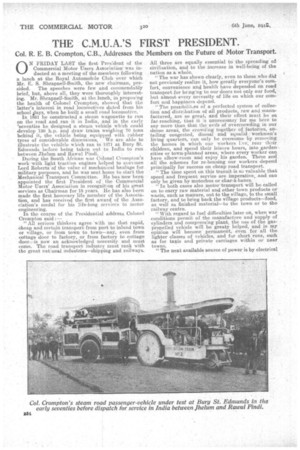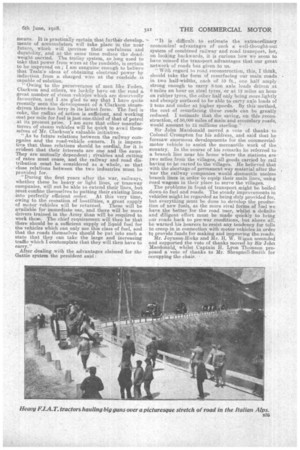THE C.M.U.A.'S FIRST PRESIDENT.
Page 12

Page 13

If you've noticed an error in this article please click here to report it so we can fix it.
Col. R. E. B. Crompton, C.B., Addresses the Members on the Future of Motor Transport 0 N FRIDAY LAST the first President of the Commercial Motor Users Association was inducted at a meeting of the members following a lunch at the Royal Automobile Club over which Mr. E.. S. Shrapaell-Smith, the new chairman presided. The speeches were few and commendably brief, but, above all, they were thoroughly interesting. Mr. Shrapnell-Smith, at the lunch, in proposing the health of Colonel Crompton, showed that the • latter's interest in road locomotives dated from his school slays, when he built a small road locomotive. In 1861 he constructed a steam wagonette to run
on the road and ran it in India, and in the early 'seventies he designed a steam vehicle which could develop 130 h.p. and draw trains weighing 70 tons behind it, the vehicle being . equipped with rubber tyres of considerable dimensions. ,, We are able to illustrate the vehilele which ran in 1871 at Bury St.. Edmunds before being taken out to India to run between Jhelum and Rawul Pindi. , During the South African war Colonel Croinpton's work with light traction engines helped to convince . Lord Roberts of the value of mechanical haulage for Military purposes, and he was sent home to start the Mechanical Transport Committee. He has now been appointed the first President of the Commercial Motor Users' Association in recognition of his great services as Chairman for 15 years. He has also been made the first honorary life member of the Association, and has received the first aWard of the Association's Medal for his life-long services to motor engineering. In the course of the Presidential address Colonel Crompton said:— "All serious thinkers agree with me that rapid, Cheap and certain transport from port to inland town or village, or from town to town—nay, even from cottage door to factory, or from factory to cottage door-is now an acknowledged necessity and must come. The road transport industry must rank with the great national industries—shipping and railways. All three are equally. essential to the spreading of civilisation, and to the increase in Well-being of the nation as a whole.
" The war has shown clearly, even to those_who did not previously realize it, how greatly everyone's com fort, convenience and health have depended on road transport for bringing to our doors not only our food, but almost every necessity of life on which our comfort and happiness depend. " The possibiliLes of a perfected system of collection and distribution Of all products, raw and manu factured,. are so great, and their effect must be sct far-reaching,that it is unnecessary for me here to say more than that the evils of overcrowding in our dense areas, the crowding together of factories, entailing congested, dismal and squalid workmen's living quarters, can only be overcome by removing the homes in which our workers live; rear their children, and spend their leisure hours, into gardencities or town-planned areas, where every worker can have elbow-room and enjoy his garden. These and all the schemes for re-housing our workers. depend principally for success on cheap road transport. "The time spent on this transit is sovaluable that speed and frequent service are imperative, and can only be given by motorbus or char-a-bancs.
In both cases also motor-transport will be called on to Carry raw material and other town products Or
waste, such as manure, out to the village, to the small factory, and to bring back the village products—food, as well as finished material—to the town or to the railway centre. • "With regard to fuel difficulties later on, when war conditions permit of the manufacture and supply of cylinders and compressing plant, the use of the gas propelled vehicle will be greaty helped, and in my opinion will become permanent, even for all the lighter classes of vehicles, and for short runs, such as for taxis and private carriages within or near towns.
"The next available source of power is by electrical
means. It is practically certain that further develop_ ments of accumulators will take place in the near future, which will increase their usefulness and durability, and at the same time reduce the deadweight carried. The trolley system, so long used to
i
take that power from wires at the roadside, s certain to be improved on; I am sanguine enough to believe that Tesla's ideas of obtaining electrical power by induction from a charged wire at the roadside is capable of solution. Owing to the perseverance of men like Foden, Clarkson and others, we luckily have on the road a great number of steam vehicles which are deservedly favourites, and I am glad to say that I have quite recently seen the developmentof a Clarkson steamdriven three-ton lorry in its latest form. The fuel is coke, the radius of action is sufficient, and working cost per mile for fuel is just one-third of that of petrol at its present price. I am sure that other manufacturers of steam vehicles will be quick to avail themselves of Mr. Clarkson's valuable initiative.
"As to future relations between the railway cornpenies and the road-vehicle owners. It is imperative that, these relations should be. cordial, for it is evident that their interests are one and the same. They are mutually dependent ; rivalries and cutting of rates must cease, and the railway and road distribution must be considered as a whole, so that close relations between the two industries must be provided for. "During the first years after the war, railways, whether these be heavy or light lines, or tramway companies, will not be 'able to extend their lines, but must confine themselves to putting their existing lines into perfectly eacient order. At this very time, owing to the cessation of hostilities, a great supply of motor Vehicles will be returned. These will be available for immediate nee, and there will be more drivers trained in the Army than will be required to work them. The chief requirement will then be that there should be a sufficient supply of liquid fuel for the vehicles which can only use this class of fuel, and that the roads themselves should be -put into such a state that they can take the large and increasing traffic which I contemplate that they will then have to carry."
ter dealing with the advantages claimed for the Gattie system the president said : "It is difficult tá estimate the extraordinary economical advantages of such i well-thought-out system of combined railway and road transport, for, on looking backwards, it is curious how We seem to have missed the transport advantages that our great network of roads has given to us.
"With regard to road reconstruction, this, I think, should take the form of resurfacing our main roads in two half-widths, each of 10 •ft., one half amply strong enough to carry 8-ton axle loads driven at 6 miles an hour on steel tyres, Or at 12 miles an hour on rubber tyres, the other half only being more lightly and cheaply surfaced to be able to carry axle loads of 2 tons and under at higher speeds. By this Method, the cost of resurfacing these roads can be greatly reduced. I estimate that the saving, on this reconstruction, of 50,000 miles of main and secondary roads, would amount to 15 millions sterling."
Sir John Macdonald moved a vote of thanks to Colonel Crompton for his address, and said that he foresaw enormous developments for the commercialmotor vehicle to assist the mercantile work of the country. In the course of his remarks he referred to a branch line near his home where the stations are two miles from the villages, all goods carried by rail having to be carted to the villages. He believed that with the shortage of permanent way material after the war the railway companies would dismantle useless branch lines in. order to equip their main lines, using road wagons in their place to serve the villages. .
The problems in front Of transport might be boiled down to fuel and roads. The steady improvements in vehicles might be regarded as being duly provided for, but everything must be done to develop the production of new fuels, as the more rival forms of fuel we have the better for the road user, whilst a definite and diligent effort must be made quickly to bring our roads back to pre-war conditions, but above all, he warned his hearers to resist any tendency for tolls to creep in in connection with motor vehicles in order tq provide funds for making and improving the roads.
Mr. Joynson-Hicks and Mr. H. W. Wigan seconded and supported the vote of thanks moved by Sir John Macdonald, whilst Captain II. Lyon Thomson proposed avote of thanks to Mr. Shrapnell-Smith for occupying the chair.






















